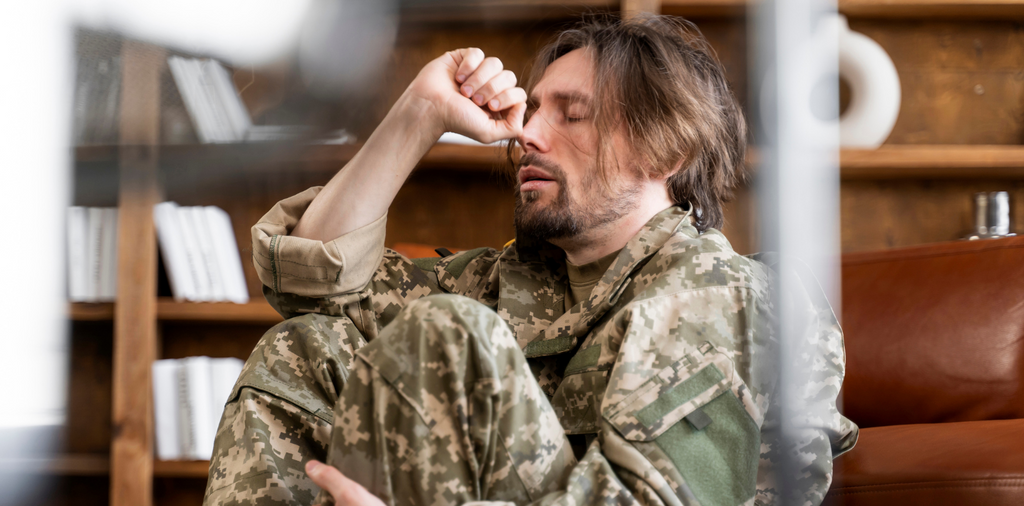For years, military personnel have silently borne the weight of post-traumatic stress disorder ("PTSD"), a mental condition. Progress has been made in destigmatizing and effectively treating PTSD, but not all veterans respond equally to available treatments.
While some find relief through pharmaceuticals like SSRIs, others seek alternative options due to side effects or limited efficacy. A holistic approach to managing PTSD offers an alternative. Holistic methods address the overall well-being of individuals, going beyond symptom treatment.
Acupuncture, a holistic path and a component of Traditional Chinese Medicine, holds promise for veterans dealing with PTSD. This article delves into the unique benefits of acupuncture, highlighting its potential as a valuable addition to treatment regimens for you or your loved ones.

Understanding PTSD
PTSD is a mental condition that develops in people who have encountered or seen a traumatic or unpleasant incident. Individuals with PTSD frequently have symptoms that appear in response to a "trigger" or catalyst that reminds them of the traumatic incident.
This can be due to battle, the amount of strain people are under in their regular tasks, sexual assault, or others. PTSD is an often devastating disorder that expresses itself in a variety of ways, including:
- Re-experiencing: A common symptom for those with PTSD is reliving their traumatic experience through flashbacks, nightmares, or intrusive thoughts. These are often disturbing and very realistic feeling memories that can cause the individual to feel as if they are back in the time and place of the event of their trauma and can be severely damaging to their mental condition.
- Avoidance: Many things can remind veterans of their traumatic experience or cause them to begin feelings associated with it, such as places, people, and activities. This often causes those with PTSD to avoid these factors in the hope that they do not trigger an episode. However, avoidance can also cause the individual to miss out on things they need or would enjoy doing, harming their quality of life.
- Adverse changes in cognition and mood: Those who have PTSD frequently experience changes in their cognitive abilities and mood as a result of the emotional and mental duress caused by the event, such as difficulty remembering things, negative thoughts about oneself, and guilt from their role in the event, losing interest in activities they otherwise enjoy, anxiety, depression, and feelings of social isolation.

What is Acupuncture? A Wellness Practice with a 2,500 Year Heritage
Acupuncture is a Traditional Chinese Medicine and a time-honored practice with a legacy spanning thousands of years. The core tenet of acupuncture is in the presence of Qi, a vital life energy that flows through the meridians, which are intricate pathways in the body.
Acupuncture seeks to address Qi imbalances that can cause manifestations of internal physical and mental imbalance, the need for wellness, stress and anxiousness. Acupuncturists gently insert small, clean needles into specific points in the body that house the meridians. The goal is to leave these needles inserted to help redirect Qi or repair the meridian pathways for Qi to restore balance to mind, body, and spirit.
A session with an Acupuncturist are painless, and many who undergo acupuncture attest to a calming sensation that can be attributed to restoring balance to Qi because acupuncture releases endorphins in the brain, easing anxiety and stress.

Because it aims to be a proactive solution that addresses concerns with the entire body and mind as opposed to individual components of a condition, acupuncture can provide the following:
- Stress reduction
- Increased mind-body connection
- Spiritual and existential exploration
- Reduced reliance on medication
- Social support
It may sound far fetched, but many studies have affirmed acupuncture's effectiveness in treating PTSD.
While the scientific basis for how acupuncture works continues to evolve, it is believed that acupuncture may work via one or more of these avenues:
- Neurotransmitter regulation: Acupuncture is known to release and balance mood-regulation hormones in the brain, such as dopamine, serotonin, and endorphins which can help modulate neurotransmitters. In this way, acupuncture becomes an excellent treatment method for PTSD patients to manage their emotional reaction to triggers and mitigate PTSD symptoms like anxiety and depression.
- Stress reduction: Endorphins are natural painkillers that also enhance moods which can help those with PTSD relax and destress.
- Autonomic nervous system modulation: Some studies have shown that acupuncture can impact the autonomic nervous system. This bodily system controls involuntary bodily functions such as blood pressure and heart rate. Using acupuncture to manipulate this system can help regulate the physiological responses PTSD can cause.
- Placebo effect: Some treatments can cause the patient to believe in the treatment’s effectiveness to the extent that it causes perceived effectiveness in a condition. This means the belief is so strong that it leads to physiological or psychological changes. Institutions such as Harvard Medical School have documented the power of the placebo effect.
Regardless of the mechanisms behind its effectiveness, acupuncture proves to be an excellent treatment option for many veterans with PTSD. Acupuncture works extremely well as a complementary therapy in conjunction with traditional treatments such as cognitive behavioral therapy (CBT).
Care Consideration: Just a reminder that the above information is not a substitute for medical care and is not a substitute for medical advice or recommendations from a healthcare provider. This information is not intended to treat, mitigate or cure any disease. That said, we encourage you to connect with an Acupuncturist in your community to learn more about this and other Traditional Chinese Medicine options. If you’ve got questions about Chinese herbal medicine or getting started with an Acupuncturist, feel free to connect with us on hello@mydaolabs.com.
















